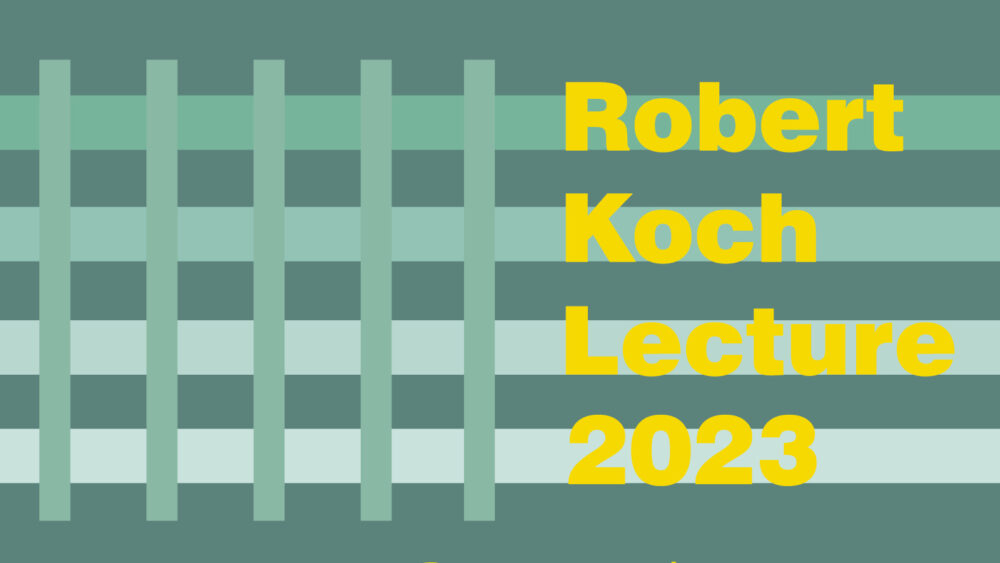

Robert Koch Lecture 2023
16. November 2023, Hörsaalruine
Every year, the Robert Koch Foundation honors outstanding scientists. The Robert Koch Prize is one of the most prestigious science prizes in Germany and is awarded to researchers for outstanding and internationally recognized scientific achievements. The Robert Koch Gold Medal recognizes the outstanding life’s work of a scientist.
The Robert Koch Prize 2023 will be awarded to Timothy Springer and Francisco Sanchez-Madrid. Patrice Courvalin is presented with the Robert Koch Gold Medal 2023.
On the occasion of the award ceremony in November, the DRFZ invites the award winners for the Robert Koch Lectures which are addressed to the scientific community.
Venue: Lecture hall ruin/Hörsaalruine, Berlin Museum of Medical History, Charitéplatz 1, 10117 Berlin
Date: 16. November 2023, 2 pm – 5 pm
Program
2:00 pm
Francisco Sánchez-Madrid, Universidad Autónoma de Madrid, Madrid, ES
Intercellular communication in the immune response: Transfer of genetic information during synapsis
2:50 pm
Timothy A. Springer, Harvard Medical School and Boston Children‘s Hospital, Boston, USA
The soul of the integrin machine
coffee break
4:10 pm
Patrice Courvalin, Institut Pasteur, Paris, FR
The evolution of glycopeptide resistance
Hosts
Andreas Radbruch, Chairman Scientific Advisory Council Robert Koch Foundation and DRFZ
Eicke Latz, Drirector Deutsches Rheuma-Forschungszentrum Berlin (DRFZ), ein Institut der Leibniz-Gemeinschaft
Emmanuelle Charpentier, Drirector Max Planck Unit for the Science of Pathogens (MPUSP)
Chronicle of the Robert Koch Lectures since 2012
- 2022, Drew Weissman (Award), University of Pennsylvania, USA. Nucleoside-modified mRNA-LNP therapeutics.
- 2022, Philip L. Felgner (Award), University of California, Irvine, USA. Nucleoside-modified mRNA-LNP therapeutics.
- 2022, Jörg Hacker (Medal), Leopoldina – Nationale Akademie der Wissenschaften. Menschen, Seuchen und Mikroben – Infektionen als gesellschaftliche Herausforderung.
- 2021, Yasmine Belkaid (Award), National Institute of Allergy and Infectious Diseases (NIAID), NIH Center for Human Immunology, Bethesda, USA. The role of microbiota in host immunity. link to lecture on youtube
- 2021, Andreas Bäumler (Award), Medical Microbiology and Immunology University of California at Davis, USA. The microbiome and gut homeostasis. link to lecture on youtube
- 2020, Shimon Sakaguchi (Award), Immunology Frontier Research Center (IFReC) at Osaka University, Japan. Control of immune responses by regulatory T cells. link to lecture on youtube
- 2020, Thomas F. Meyer (Medal), Director Emeritus at the Max Planck Institute for Infection Biology and Senior Professor at the Christian-Albrechts-Universität zu Kiel, Germany. From infection research towards understanding how cancer develops. link to lecture on youtube
- 2019, Rino Rappuoli (Award), Chief Scientist und Head of External Research and Development (R&D) bei GlaxoSmithKline (GSK) Vaccines in Siena, Italy. Vaccines for 8 billion people.
- 2019, Martin J. Blaser (Medal), Director of the Center for Advanced Biotechnology and Medicine (CABM) at Rutgers Biomedical and Health Sciences (RBHS), Henry Rutgers Chair of the Human Microbiome and Professor of Medicine and Microbiology at the Rutgers Robert Wood Johnson Medical School in New Jersey, USA. Perturbing the early-life microbiome and pandemic chronic noncommunicable diseases.
- 2018, Jeffrey Ravetch (Award), The Rockefeller University, New York, USA. Fc receptors – drivers of immunity.
- 2017, Rafi Ahmed (Award), Emory Vaccine Center at Emory, University School of Medicine, Atlanta, USA. T cell exhaustion and PD-1 therapy.
- 2017, Antonio Lanzavecchia (Award), Institute for Research in Biomedicine, Bellinzona, Switzerland. Dissecting human antibody responses: useful, basic and surprising findings.
- 2016, Michel Nussenzweig (Award), Howard Hughes Medical Institute, The Rockefeller University, USA. The HIV-1 problem.
- 2016, Alberto Mantovani (Award), Humanitas University, Milan, Italy. Inflammation and cancer from bench to bedside.
- 2015, Charles M. Rice (Award), The Rockefeller University, New York, USA. Hepatitis C virus: challenges, triumphs and surprises.
- 2015, Ralf Bartenschlager (Award), Universitätsklinikum Heidelberg, Germany. Hepatitis C virus: past, present and future.
- 2014, Alain Fischer (Award), National Health Institute of Medical Research (INSERM), Necker Hospital, Paris, France. Primary immunodeficiencies as model diseases for the development of stem cell gene therapy.
- 2014, Jean-Laurent Casanova (Award), The Rockefeller University, New York, USA. Toward a genetic theory of infectious diseases of childhood.
- 2013, Jeffrey Gordon (Award), Washington University School of Medicine, USA. The human gut microbiota and childhood undernutrition: looking at human development from a microbial perspective.
- 2012, Tasuku Honjo (Award), Department of Immunology and Genomic Medicine, Kyoto University Graduate School of Medicine, Japan. Acquired immunity, genome instability, cancer.
Since 2020, Andreas Radbruch has been Chairman of the Scientific Advisory Council of the Robert Koch Foundation.

 English
English